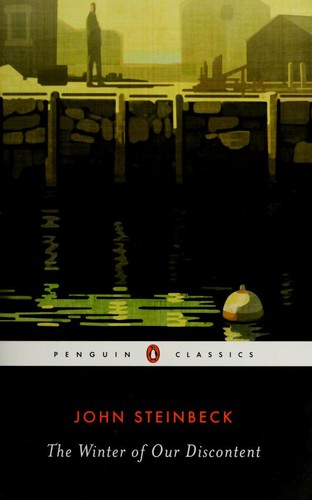M@ reviewed The winter of our discontent by Steinbeck (Penguin classics)
Review of 'The winter of our discontent' on 'Goodreads'
5 stars
Our protagonist, Ethan Allen Hawley, is talking to his surly teen-aged son about an essay. When asked about its subject, the teen sullenly says "Patriotic Jazz." Ethan replies:
"Patriotic jazz. How’s this for beat? ‘Is life so dear or peace so sweet as to be purchased at the price of chains and slavery? Forbid it, Almighty God! I know not what course others may take, but as for me, give me liberty or give me death!’ ”
“Great! That’s the berries.”
“Sure is. There were giants on the earth in those days.”
That last line was swiped from Genesis 6:4 (KJV, of course) by a writer whose magnum opus touches on the same book. (To wit, [b:East of Eden|4406|East of Eden|John Steinbeck|https://images.gr-assets.com/books/1441547516s/4406.jpg|2574991]) It works on quite a few levels (and foreshadows the eventual plagiarism scandal that will attend this essay) and I'd like to borrow it eventually.
Ethan's …
Our protagonist, Ethan Allen Hawley, is talking to his surly teen-aged son about an essay. When asked about its subject, the teen sullenly says "Patriotic Jazz." Ethan replies:
"Patriotic jazz. How’s this for beat? ‘Is life so dear or peace so sweet as to be purchased at the price of chains and slavery? Forbid it, Almighty God! I know not what course others may take, but as for me, give me liberty or give me death!’ ”
“Great! That’s the berries.”
“Sure is. There were giants on the earth in those days.”
That last line was swiped from Genesis 6:4 (KJV, of course) by a writer whose magnum opus touches on the same book. (To wit, [b:East of Eden|4406|East of Eden|John Steinbeck|https://images.gr-assets.com/books/1441547516s/4406.jpg|2574991]) It works on quite a few levels (and foreshadows the eventual plagiarism scandal that will attend this essay) and I'd like to borrow it eventually.
Ethan's situation is dire; while he grew up as the scion of a family of Puritans and privateers, he left town for Harvard and then shortly afterwards a short trip through Europe to kill Nazis. While he was gone, other rich people conspired to send his prospects up in smoke: they burned both his father's ship and his family's fortune to the waterline. He's now a grocery clerk, industrious but somewhat underemployed. The novel shows us a day in his life, and sets up an epic showdown with the novel's antagonist: greed.
The central metaphor there is for America as a whole, how greed and ambition and material comfort had corrupted the country's morals and ethics. And littered throughout the text are Ethan's observations on wealth and money, which just made me nod vigorously:
Any man of reasonable intelligence can make money if that’s what he wants. Mostly it’s women or clothes or admiration he really wants and they deflect him.
The great artists of finance like Morgan and Rockefeller weren’t deflected. They wanted and got money, just simple money. What they did with it afterward is another matter. I’ve always felt they got scared of the ghost they raised and tried to buy it off.
It's chockablock with gems like that. This passage took my breath away:
My dreams are the problems of the day stepped up to absurdity, a little like men dancing, wearing the horns and masks of animals.
I told a friend about it, and said that I'd never heard another human being describe so exactly what happens in my dreams. Her response: "I think most people just don't have the words to describe it but feel just the same." If you strip away the antecedent, she pretty much describes how I feel about Steinbeck. For any value of "it" you care to use, he has the words to describe it, most people don't, but feel just the same.
How is it possible for a novelist to do that? Easy: there were giants on the earth in those days.

